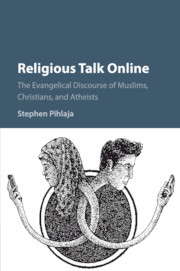
Religious Talk Online
The Evangelical Discourse of Muslims, Christians, and Atheists
- Publisher's listprice GBP 32.00
-
15 288 Ft (14 560 Ft + 5% VAT)
The price is estimated because at the time of ordering we do not know what conversion rates will apply to HUF / product currency when the book arrives. In case HUF is weaker, the price increases slightly, in case HUF is stronger, the price goes lower slightly.
- Discount 10% (cc. 1 529 Ft off)
- Discounted price 13 759 Ft (13 104 Ft + 5% VAT)
Subcribe now and take benefit of a favourable price.
Subscribe
15 288 Ft

Availability
Estimated delivery time: In stock at the publisher, but not at Prospero's office. Delivery time approx. 3-5 weeks.
Not in stock at Prospero.
Why don't you give exact delivery time?
Delivery time is estimated on our previous experiences. We give estimations only, because we order from outside Hungary, and the delivery time mainly depends on how quickly the publisher supplies the book. Faster or slower deliveries both happen, but we do our best to supply as quickly as possible.
Product details:
- Publisher Cambridge University Press
- Date of Publication 17 September 2020
- ISBN 9781316610183
- Binding Paperback
- No. of pages198 pages
- Size 230x153x10 mm
- Weight 300 g
- Language English
- Illustrations 3 b/w illus. 6 tables 96
Categories
Short description:
Original research that explains how religious conflict is played out on social media.
MoreLong description:
In the online world, people argue about anything and everything - religion is no exception. Stephen Pihlaja investigates how several prominent social media figures present views about religion in an environment where their positions are challenged. The analysis shows how conflict creates a space for users to share, explain, and develop their opinions and beliefs, by making appeals to both a core audience of like-minded viewers and a broader audience of viewers who are potentially interested in the claims, ambivalent, or openly hostile. The book argues that in the back-and-forth of these arguments, the positions that users take in response to the arguments of others have consequences for how religious talk develops, and potentially for how people understand and practice their beliefs in the twenty-first century. Based on original empirical research, it addresses long-debated questions in sociolinguistics and discourse analysis regarding the role of language in building solidarity, defining identity and establishing genres and registers of interaction.
'Pihlaja's study is valuable to sociologists of religion for his insights into atheism and modes of proselytism, and his in-depth qualitative study of discourse dynamics makes a compelling argument to sociolinguists that 'social media offers a uniquely transparent, public, and immediate view of how people talk about religion'.' Michael Munnik, Discourse & Communication
Table of Contents:
1. Introduction: religious interaction online; 2. Finding and analysing religious interaction; 3. Conflicts; 4. Stories and storylines; 5. Themes; 6. Conclusion: Evangelical outreach - arguing, appealing, and consoling.
More



